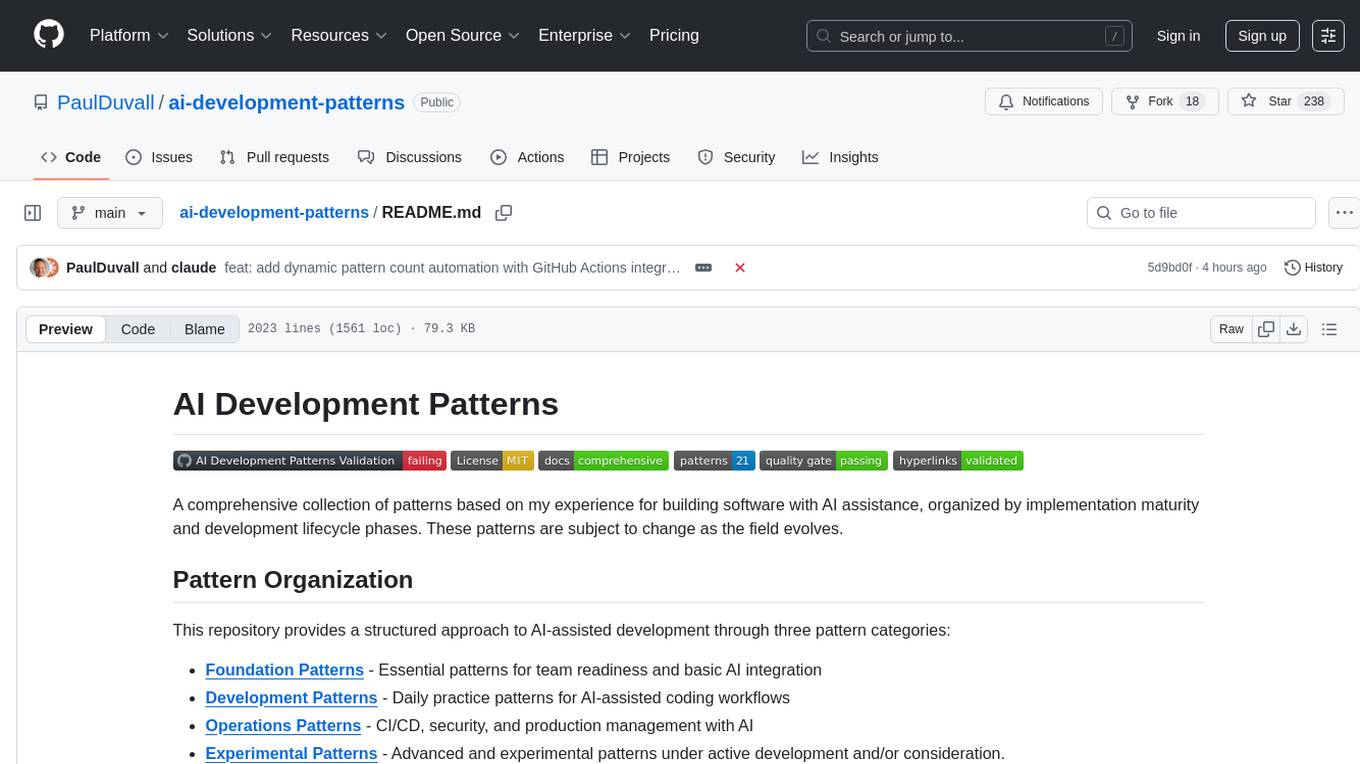
dotclaude
A comprehensive development environment with specialized AI agents for code review, security analysis, and technical leadership.
Stars: 149
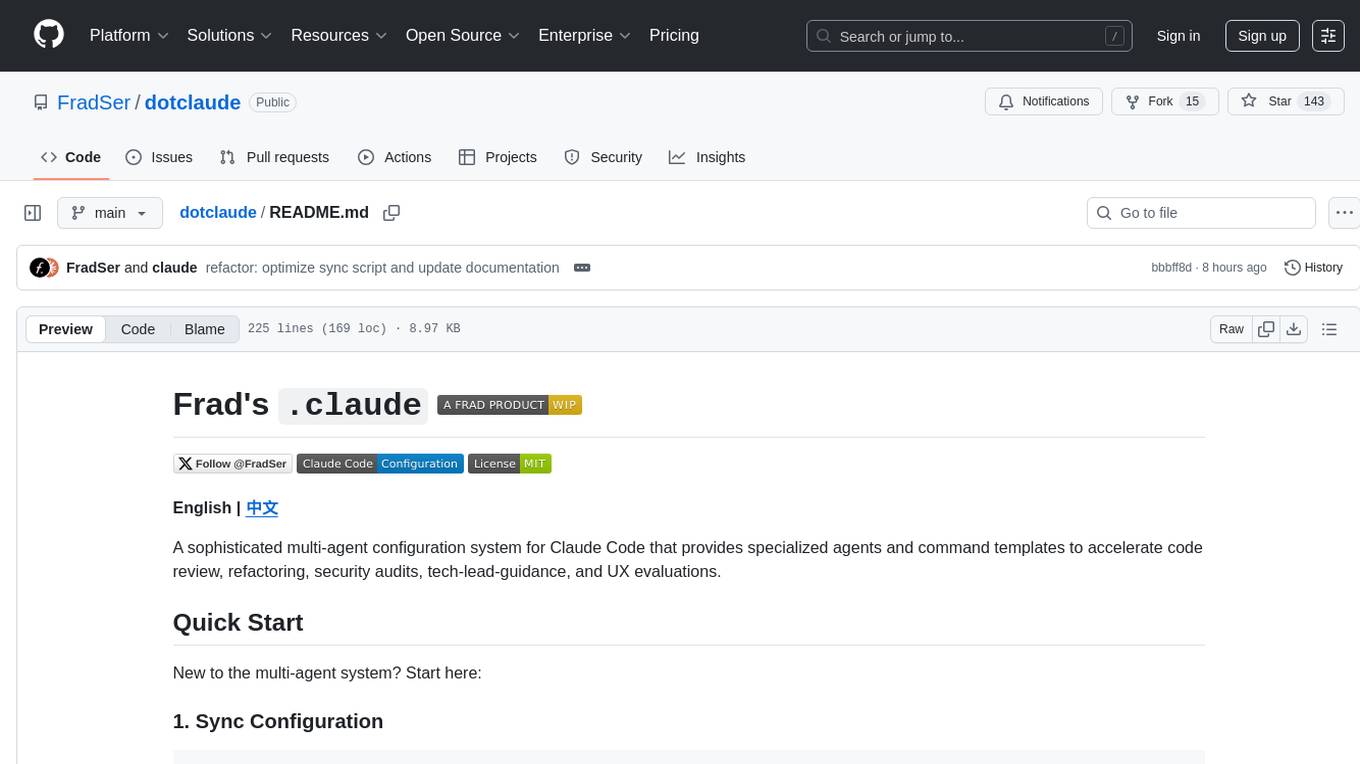
A sophisticated multi-agent configuration system for Claude Code that provides specialized agents and command templates to accelerate code review, refactoring, security audits, tech-lead-guidance, and UX evaluations. It offers essential commands, directory structure details, agent system overview, command templates, usage patterns, collaboration philosophy, sync management, advanced usage guidelines, and FAQ. The tool aims to streamline development workflows, enhance code quality, and facilitate collaboration between developers and AI agents.
README:
English | 中文
A sophisticated multi-agent configuration system for Claude Code that provides specialized agents and command templates to accelerate code review, refactoring, security audits, tech-lead-guidance, and UX evaluations.
New to the multi-agent system? Start here:
bash <(curl -fsSL https://raw.githubusercontent.com/FradSer/dotclaude/main/sync-to-github.sh)In any Claude Code conversation:
-
@agent-code-reviewer- Review your code for issues -
@agent-security-reviewer- Check for security vulnerabilities -
@agent-ux-reviewer- Evaluate user interface designs
Three-stage collaborative process for comprehensive code quality:
-
Hierarchical Review - Use
/review/hierarchicalfor thorough multi-agent analysis- Review and validate Claude's analysis before proceeding
-
Issue Creation - Use
/gh/create-issuesto create GitHub issues for tracking improvements- Check and refine the issues Claude suggests before creating
-
Quality Implementation - Use
/gh/resolve-issueswith intelligent branch detection, AI-generated names, and worktree management- Automatically detects existing worktrees and offers continuation options
- Uses AI to generate concise, descriptive branch names
- Review Claude's code suggestions and adapt them to your context
Each step requires engineer validation to ensure Claude's output aligns with project goals and constraints. See Collaboration Philosophy for partnership principles.
Open these templates as checklists in Claude Code:
-
Quick review:
commands/review/quick.md -
Fix issues:
commands/fix/code-quality.md -
Commit changes:
commands/git/commit-and-push.md
- Browse Specialized Agents for all available experts
- Explore Command Templates for structured workflows
- Set up Multi-Agent Collaboration pipelines
What the sync script does (click to expand)
- Syncs
~/.claude/{agents,commands,CLAUDE.md}with the same paths in this repo (two-way comparison) -
Automatic Local Agents Management: Detects
local-agents/directory and copies agents to project's.claude/agents/ - Automatically detects whether it runs inside this repo or clones into
/tmp/dotclaude-sync - Shows a diff for each item and lets you interactively choose: use local, use repo, or skip (supports color diff)
- At the end, you can choose to commit and push (generates a Conventional/Commitizen-style message or falls back to a built-in template)
Prerequisites:
-
git,curl,bash 3.2+(macOS defaults are fine) - Optional:
colordiff(for colored diffs),claudeCLI (for better commit message generation)
dotclaude/
- agents/ # Global agents (available in all projects)
- code-reviewer.md
- code-simplifier.md
- security-reviewer.md
- tech-lead-reviewer.md
- ux-reviewer.md
- local-agents/ # Local agents (project-specific)
- swiftui-clean-architecture-reviewer.md
- commands/
- continue.md
- fix/
- code-quality.md
- security.md
- ui.md
- gh/
- create-issues.md
- resolve-issues.md
- git/
- commit-and-push.md
- commit.md
- push.md
- release.md
- refactor.md
- review/
- hierarchical.md
- quick.md
- CLAUDE.md
- README.md
- sync-to-github.sh
Universal specialized agents available in all projects, stored in agents/ directory:
| Agent | Purpose | Focus Areas |
|---|---|---|
| agent-code-reviewer | Comprehensive code review | Correctness, error handling, maintainability, best practices |
| agent-code-simplifier | Refactoring & optimization | Readability, complexity reduction, DRY principles |
| agent-security-reviewer | Security audit & hardening | AuthN/AuthZ, input validation, dependency scanning |
| agent-tech-lead-reviewer | Architectural guidance | System design, technical direction, risk assessment |
| agent-ux-reviewer | User experience evaluation | Usability heuristics, accessibility standards, UI consistency |
Project-specific specialized agents stored in local-agents/ directory, copied to project's .claude/agents/ via sync script:
| Agent | Purpose | Focus Areas | Target Projects |
|---|---|---|---|
| swiftui-clean-architecture-reviewer | SwiftUI Clean Architecture review | Layer separation, MVVM patterns, SwiftData integration, @Observable patterns | SwiftUI projects |
Structured workflows for common development tasks:
-
/review/quick- Two-stage rapid review process -
/review/hierarchical- Multi-layered parallel reviews with consolidated output
-
/fix/code-quality- Code quality improvements (naming, complexity, performance) -
/fix/security- Security vulnerability identification and remediation -
/fix/ui- UI/UX consistency and usability enhancements
-
/git/commit.md- Structured commit workflow -
/git/commit-and-push- Combined commit and push operations -
/git/push- Push with validation checks -
/git/release- Git-flow release management
-
/gh/create-issues- Issue creation with templates -
/gh/resolve-issues- Smart issue resolution with branch detection, AI-generated names, and worktree continuation
-
/continue- Resume interrupted work sessions -
/refactor- Systematic code refactoring checklist
-
Open command templates - Use
commands/*.mdfiles as interactive checklists - Follow structured processes - Each template guides you through specific workflows
- Maintain consistency - Standardized approaches across team members
Global Agents (available in any project):
@agent-code-reviewer # Comprehensive code analysis
@agent-security-reviewer # Security-focused audit
@agent-tech-lead-reviewer # Architectural guidance
@agent-ux-reviewer # User experience evaluation
@agent-code-simplifier # Refactoring assistance
Local Agents (must be copied to project via sync script first):
@swiftui-clean-architecture-reviewer # SwiftUI Clean Architecture review
# Example: Comprehensive review pipeline
@agent-code-reviewer → @agent-security-reviewer → @agent-tech-lead-reviewerClaude Code as Your Development Partner
Treat Claude Code as an excellent colleague who collaborates asynchronously. This partnership provides specialized expertise and quality assurance while requiring your validation at each step to ensure alignment with project goals.
GitHub as a Collaboration Platform
GitHub with gh CLI creates seamless integration between Claude Code and project management. Issues, pull requests, and commits become structured documentation, transforming development into thoughtful technical writing where both human decisions and AI insights are captured and trackable.
- Run Quick Sync periodically to maintain alignment with the repository
- Interactive diff resolution for local vs. remote changes
- Automatic commit message generation with Conventional style
See CLAUDE.md for full development guidelines. Key points:
Architecture
- Follow SOLID principles; prefer composition over inheritance
- Use dependency injection for testability
- Repository pattern for data access, Strategy pattern for algorithmic variations
Code Quality
- Semantic naming; avoid magic numbers; keep functions small
- Cover error scenarios with meaningful messages
- Comment on "why" rather than "what"
Development Standards
- Search first when unsure; write tests for core functionality
- Update docs with code changes; prefer
pnpmfor Node.js projects - Commit messages: English only, Conventional style (≤50 chars)
- Atomic commits; no emojis; PRs use merge commits
- Is the sync script non-interactive? It is interactive: choose local vs. repo per item and decide whether to commit and push at the end.
- No colored diffs? Optionally install
colordiff; the script will auto-detect and use it.
MIT License
For Tasks:
Click tags to check more tools for each tasksFor Jobs:
Alternative AI tools for dotclaude
Similar Open Source Tools

dotclaude
A sophisticated multi-agent configuration system for Claude Code that provides specialized agents and command templates to accelerate code review, refactoring, security audits, tech-lead-guidance, and UX evaluations. It offers essential commands, directory structure details, agent system overview, command templates, usage patterns, collaboration philosophy, sync management, advanced usage guidelines, and FAQ. The tool aims to streamline development workflows, enhance code quality, and facilitate collaboration between developers and AI agents.
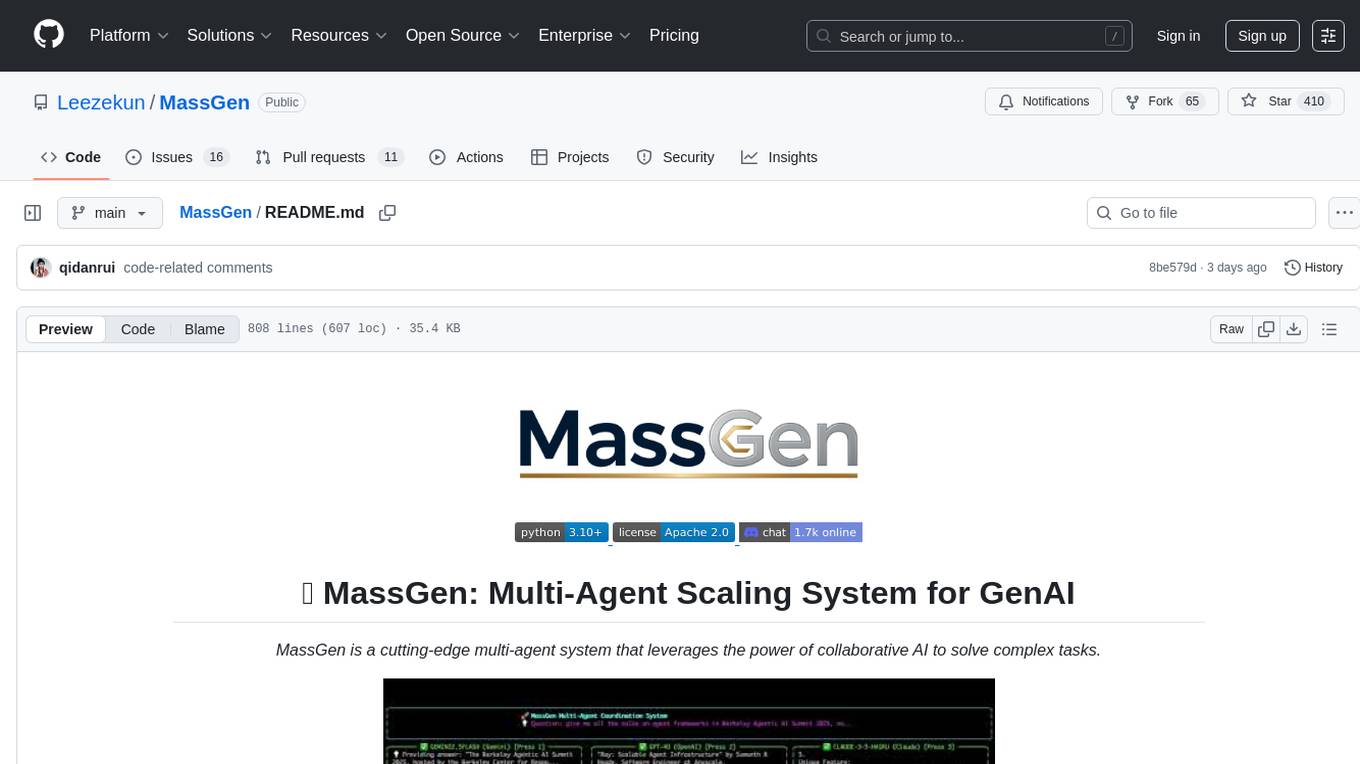
MassGen
MassGen is a cutting-edge multi-agent system that leverages the power of collaborative AI to solve complex tasks. It assigns a task to multiple AI agents who work in parallel, observe each other's progress, and refine their approaches to converge on the best solution to deliver a comprehensive and high-quality result. The system operates through an architecture designed for seamless multi-agent collaboration, with key features including cross-model/agent synergy, parallel processing, intelligence sharing, consensus building, and live visualization. Users can install the system, configure API settings, and run MassGen for various tasks such as question answering, creative writing, research, development & coding tasks, and web automation & browser tasks. The roadmap includes plans for advanced agent collaboration, expanded model, tool & agent integration, improved performance & scalability, enhanced developer experience, and a web interface.
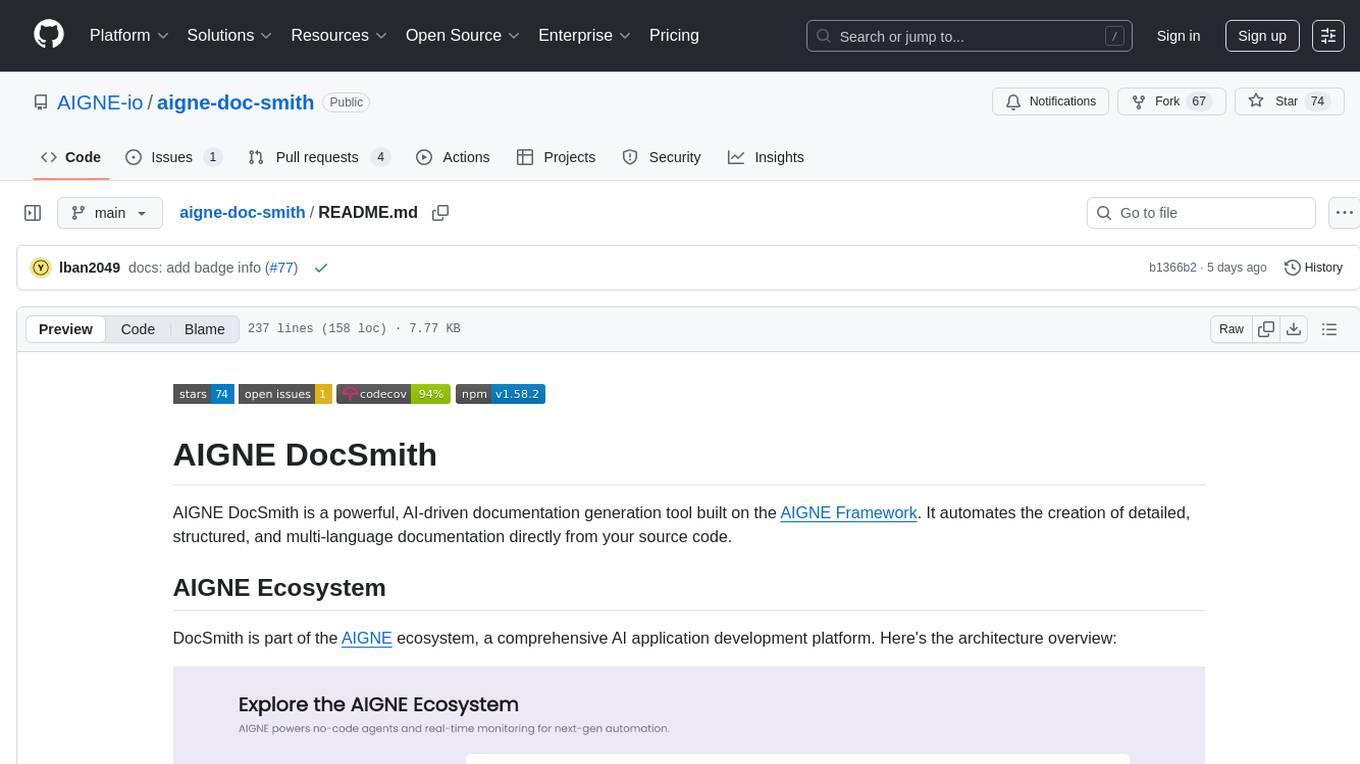
aigne-doc-smith
AIGNE DocSmith is a powerful AI-driven documentation generation tool that automates the creation of detailed, structured, and multi-language documentation directly from source code. It intelligently analyzes codebase to generate a comprehensive document structure, populates content with high-quality AI-powered generation, supports seamless translation into 12+ languages, integrates with AIGNE Hub for large language models, offers Discuss Kit publishing, automatically updates documentation with source code changes, and allows for individual document optimization.
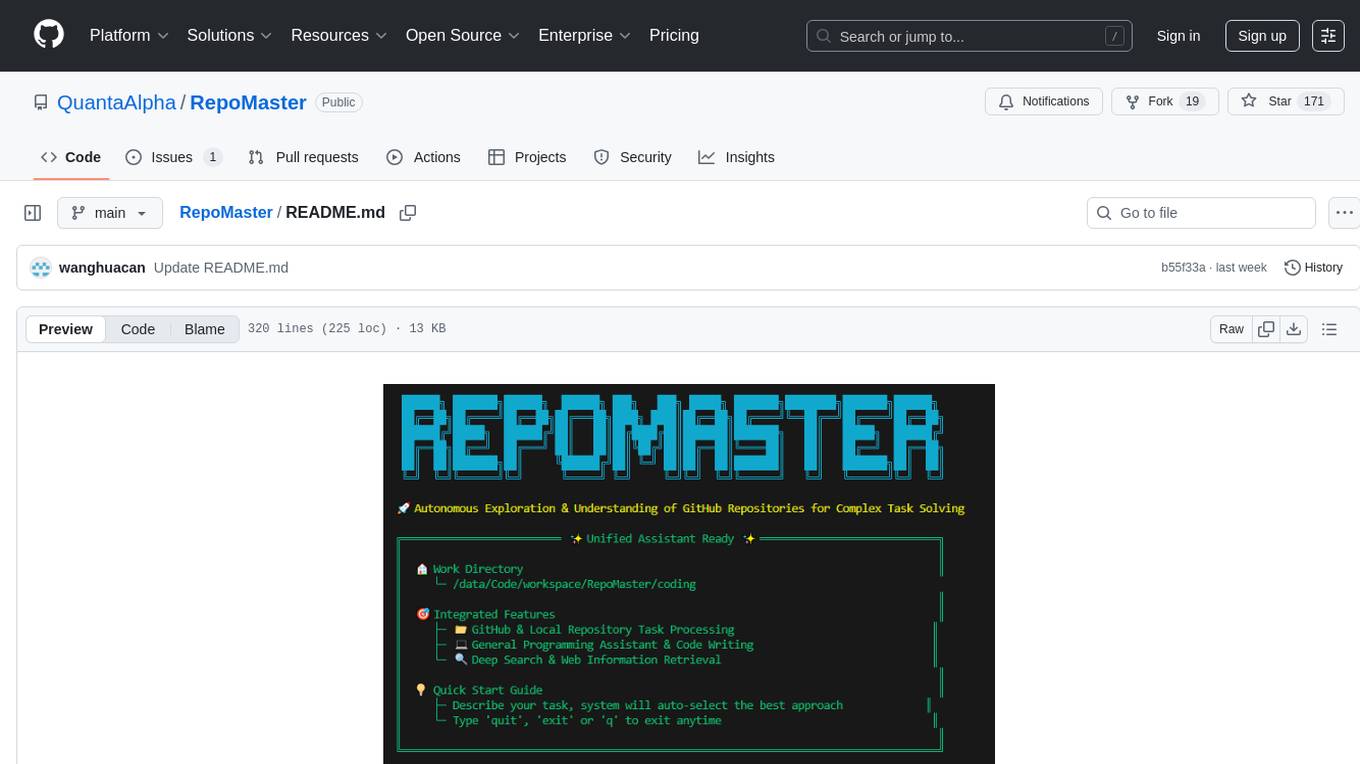
RepoMaster
RepoMaster is an AI agent that leverages GitHub repositories to solve complex real-world tasks. It transforms how coding tasks are solved by automatically finding the right GitHub tools and making them work together seamlessly. Users can describe their tasks, and RepoMaster's AI analysis leads to auto discovery and smart execution, resulting in perfect outcomes. The tool provides a web interface for beginners and a command-line interface for advanced users, along with specialized agents for deep search, general assistance, and repository tasks.
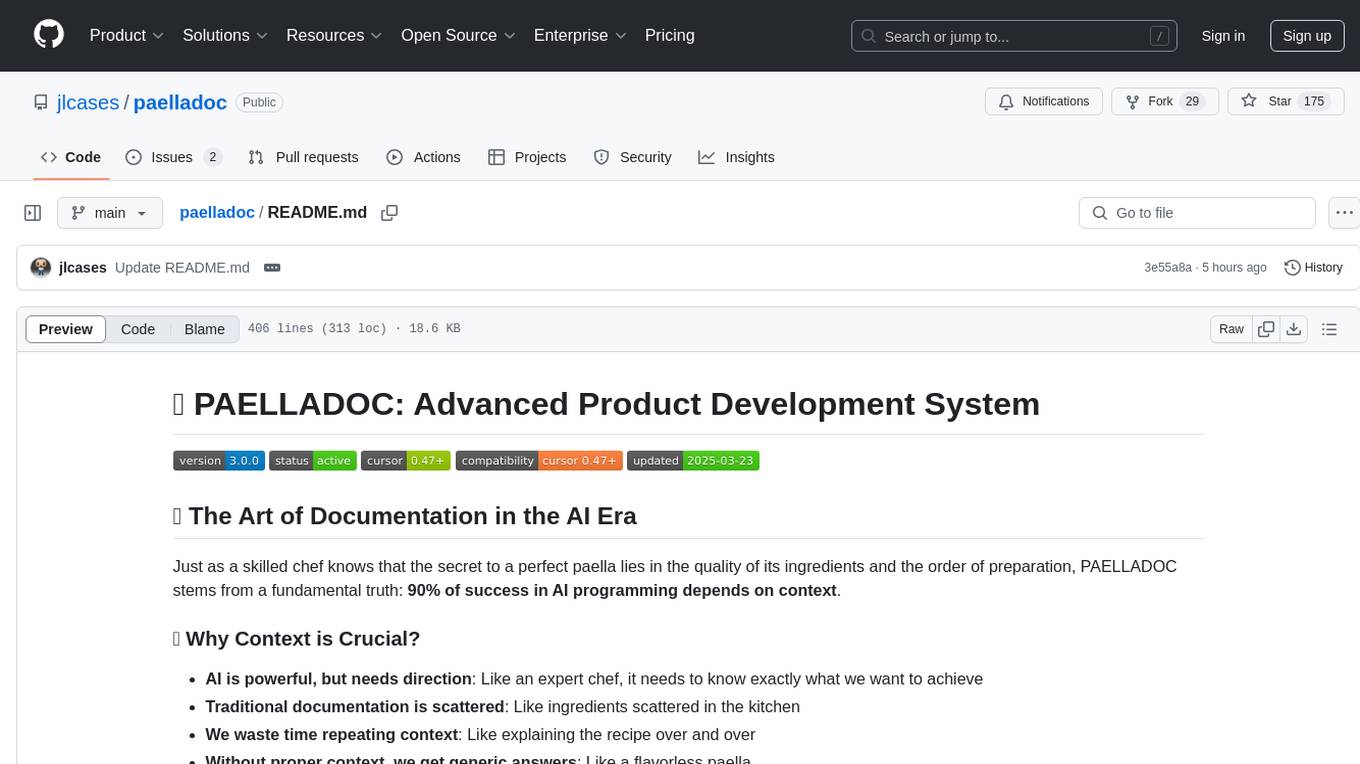
paelladoc
PAELLADOC is an intelligent documentation system that uses AI to analyze code repositories and generate comprehensive technical documentation. It offers a modular architecture with MECE principles, interactive documentation process, key features like Orchestrator and Commands, and a focus on context for successful AI programming. The tool aims to streamline documentation creation, code generation, and product management tasks for software development teams, providing a definitive standard for AI-assisted development documentation.
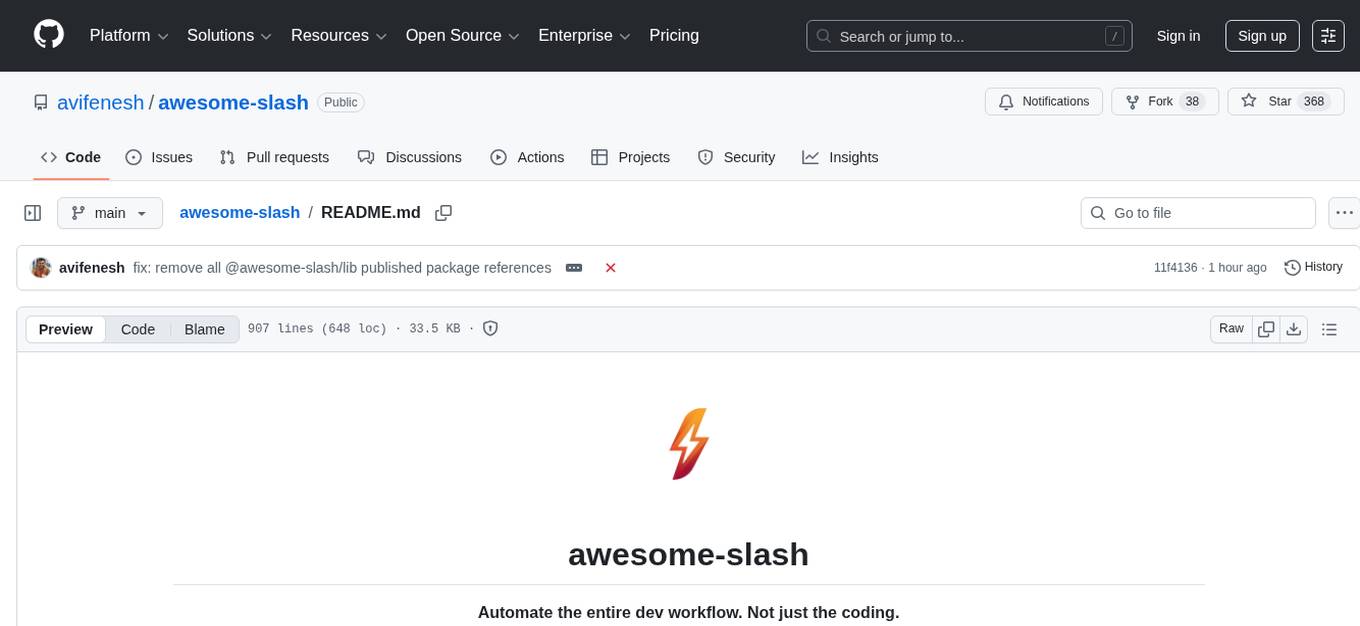
awesome-slash
Automate the entire development workflow beyond coding. awesome-slash provides production-ready skills, agents, and commands for managing tasks, branches, reviews, CI, and deployments. It automates the entire workflow, including task exploration, planning, implementation, review, and shipping. The tool includes 11 plugins, 40 agents, 26 skills, and 26k lines of lib code, with 3,357 tests and support for 3 platforms. It works with Claude Code, OpenCode, and Codex CLI, offering specialized capabilities through skills and agents.
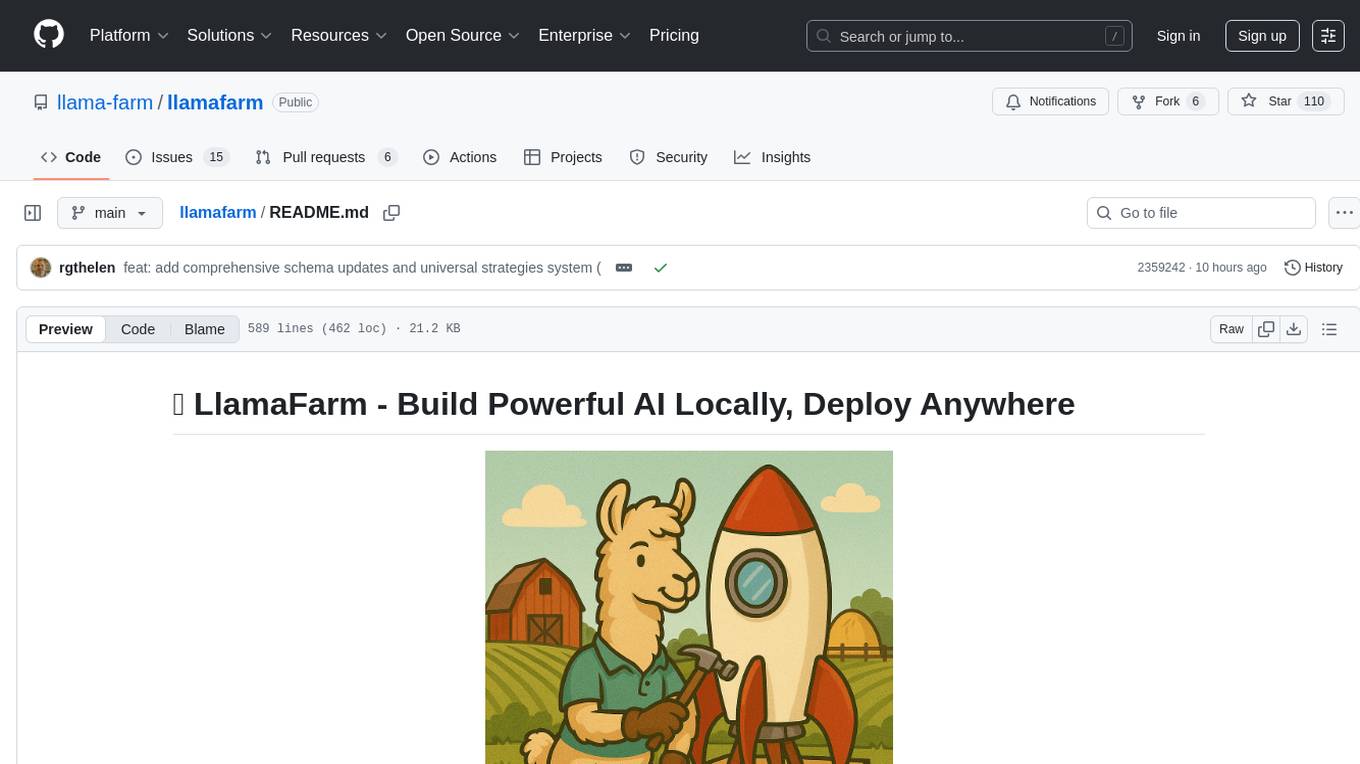
llamafarm
LlamaFarm is a comprehensive AI framework that empowers users to build powerful AI applications locally, with full control over costs and deployment options. It provides modular components for RAG systems, vector databases, model management, prompt engineering, and fine-tuning. Users can create differentiated AI products without needing extensive ML expertise, using simple CLI commands and YAML configs. The framework supports local-first development, production-ready components, strategy-based configuration, and deployment anywhere from laptops to the cloud.
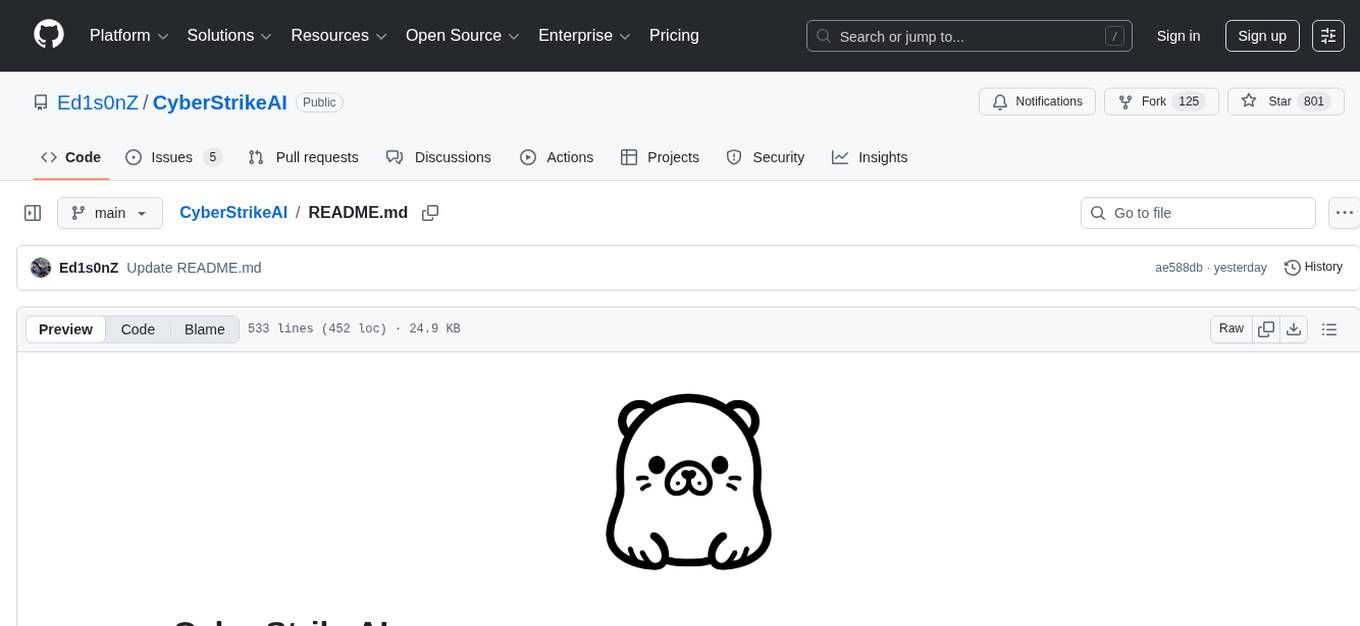
CyberStrikeAI
CyberStrikeAI is an AI-native security testing platform built in Go that integrates 100+ security tools, an intelligent orchestration engine, role-based testing with predefined security roles, a skills system with specialized testing skills, and comprehensive lifecycle management capabilities. It enables end-to-end automation from conversational commands to vulnerability discovery, attack-chain analysis, knowledge retrieval, and result visualization, delivering an auditable, traceable, and collaborative testing environment for security teams. The platform features an AI decision engine with OpenAI-compatible models, native MCP implementation with various transports, prebuilt tool recipes, large-result pagination, attack-chain graph, password-protected web UI, knowledge base with vector search, vulnerability management, batch task management, role-based testing, and skills system.
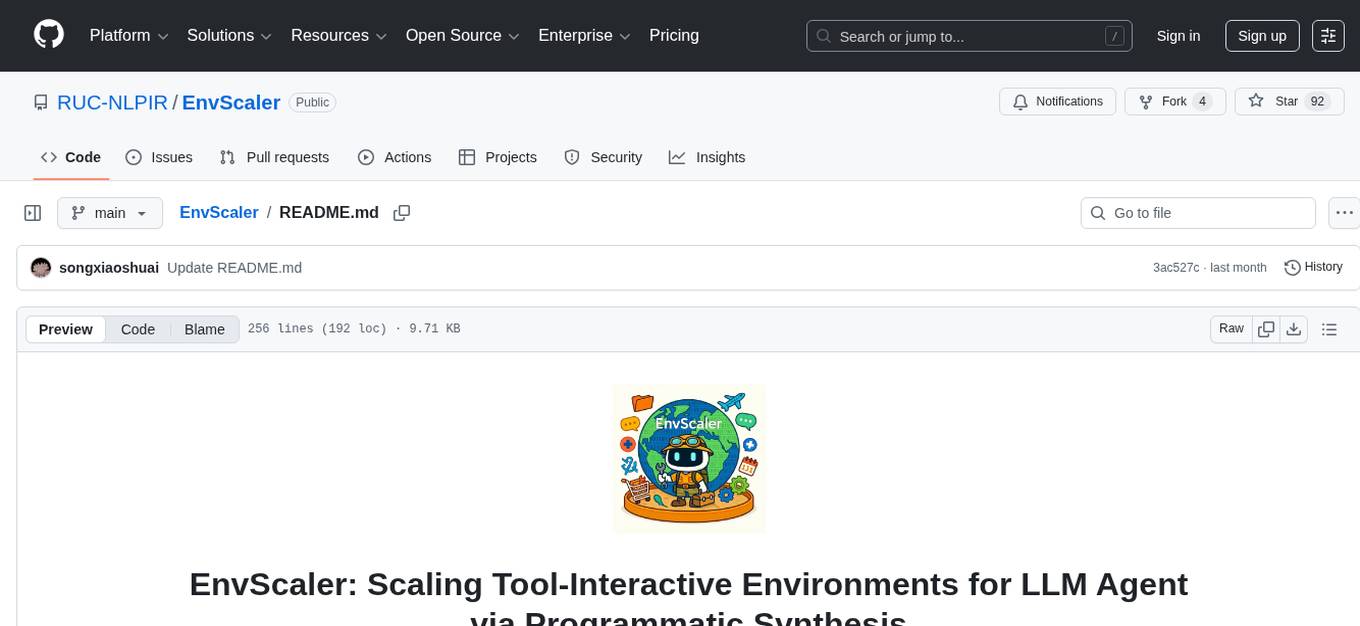
EnvScaler
EnvScaler is an automated, scalable framework that creates tool-interactive environments for training LLM agents. It consists of SkelBuilder for environment description mining and quality inspection, ScenGenerator for synthesizing multiple environment scenarios, and modules for supervised fine-tuning and reinforcement learning. The tool provides data, models, and evaluation guides for users to build, generate scenarios, collect training data, train models, and evaluate performance. Users can interact with environments, build environments from scratch, and improve LLMs' task-solving abilities in complex environments.
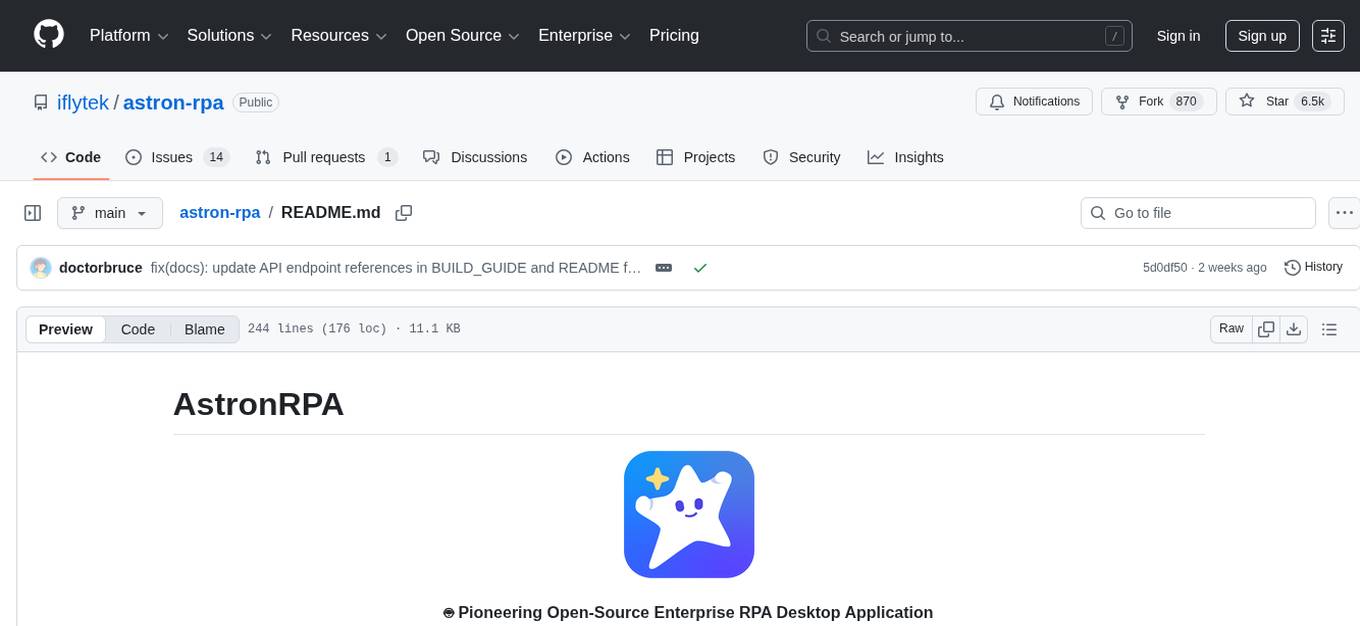
astron-rpa
AstronRPA is an enterprise-grade Robotic Process Automation (RPA) desktop application that supports low-code/no-code development. It enables users to rapidly build workflows and automate desktop software and web pages. The tool offers comprehensive automation support for various applications, highly component-based design, enterprise-grade security and collaboration features, developer-friendly experience, native agent empowerment, and multi-channel trigger integration. It follows a frontend-backend separation architecture with components for system operations, browser automation, GUI automation, AI integration, and more. The tool is deployed via Docker and designed for complex RPA scenarios.
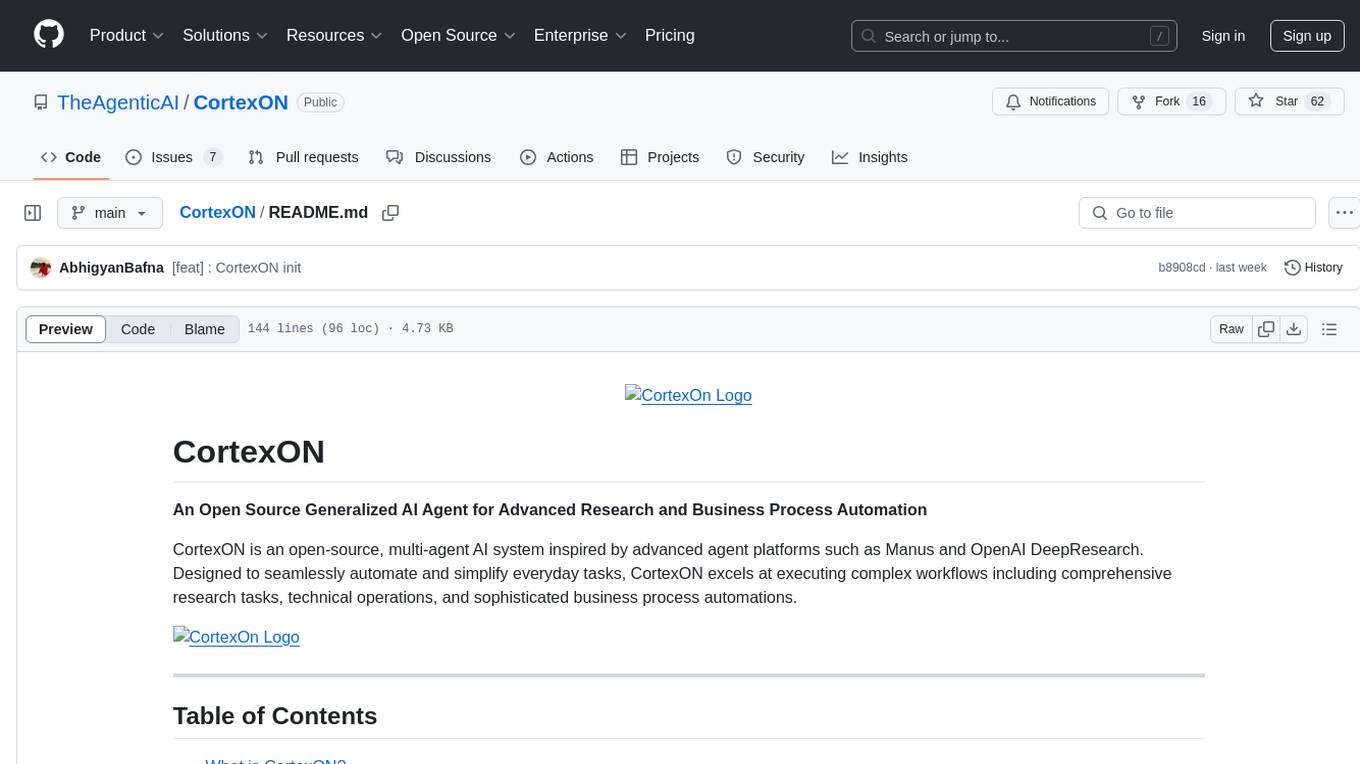
CortexON
CortexON is an open-source, multi-agent AI system designed to automate and simplify everyday tasks. It integrates specialized agents like Web Agent, File Agent, Coder Agent, Executor Agent, and API Agent to accomplish user-defined objectives. CortexON excels at executing complex workflows, research tasks, technical operations, and business process automations by dynamically coordinating the agents' unique capabilities. It offers advanced research automation, multi-agent orchestration, integration with third-party APIs, code generation and execution, efficient file and data management, and personalized task execution for travel planning, market analysis, educational content creation, and business intelligence.
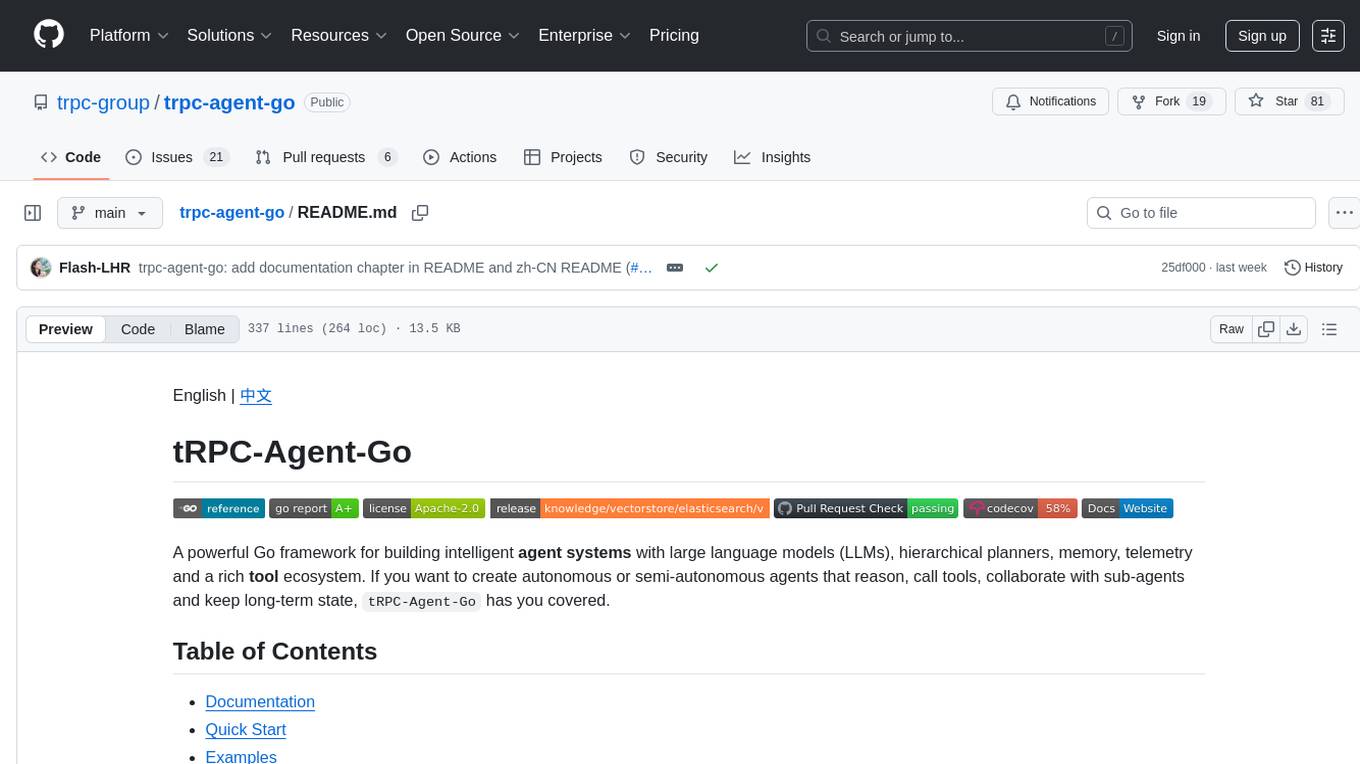
trpc-agent-go
A powerful Go framework for building intelligent agent systems with large language models (LLMs), hierarchical planners, memory, telemetry, and a rich tool ecosystem. tRPC-Agent-Go enables the creation of autonomous or semi-autonomous agents that reason, call tools, collaborate with sub-agents, and maintain long-term state. The framework provides detailed documentation, examples, and tools for accelerating the development of AI applications.
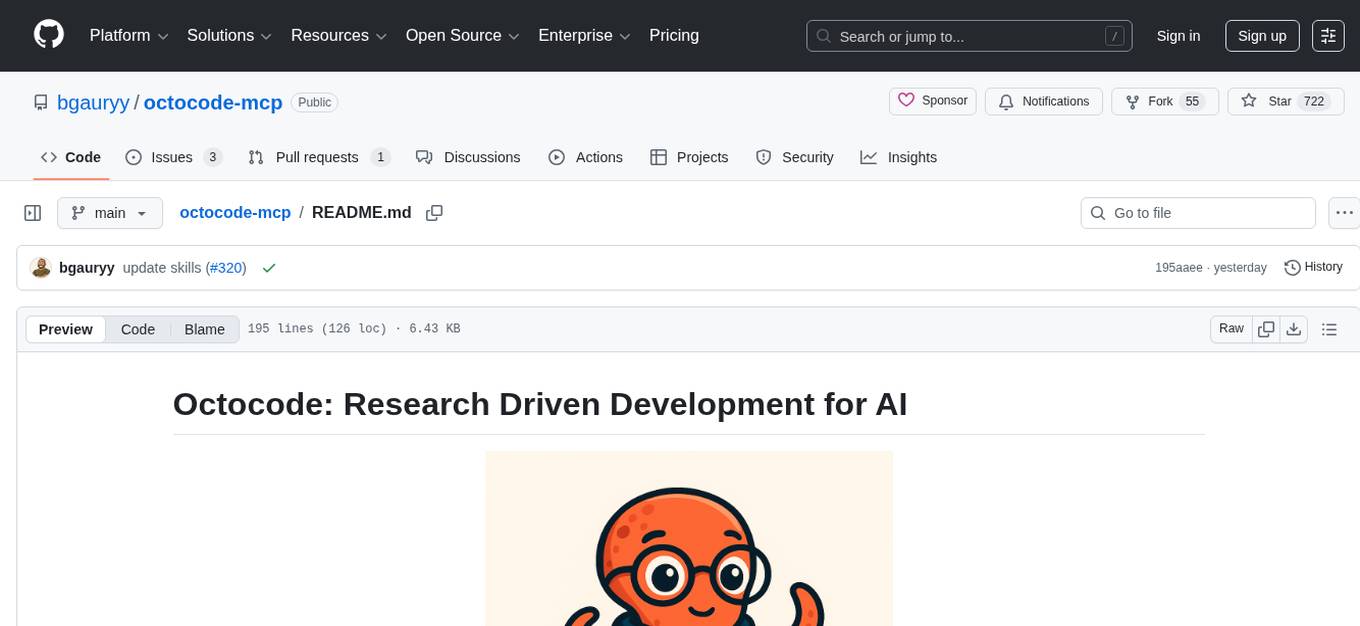
octocode-mcp
Octocode is a methodology and platform that empowers AI assistants with the skills of a Senior Staff Engineer. It transforms how AI interacts with code by moving from 'guessing' based on training data to 'knowing' based on deep, evidence-based research. The ecosystem includes the Manifest for Research Driven Development, the MCP Server for code interaction, Agent Skills for extending AI capabilities, a CLI for managing agent capabilities, and comprehensive documentation covering installation, core concepts, tutorials, and reference materials.
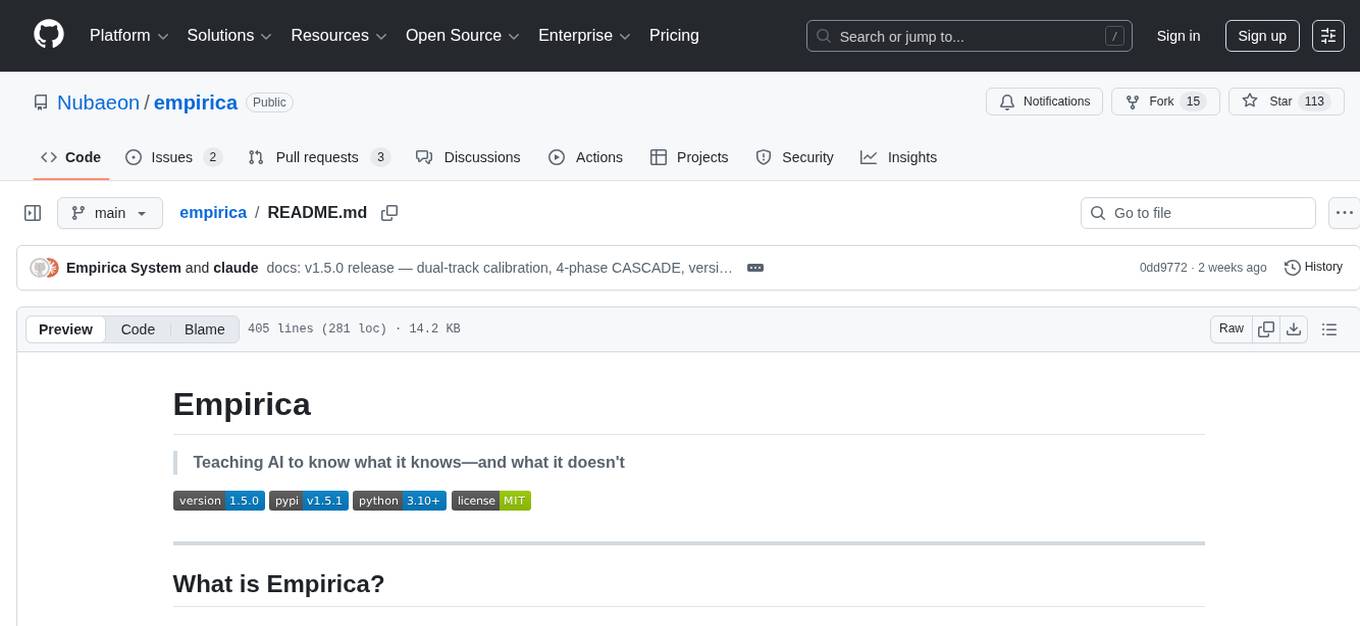
empirica
Empirica is an epistemic self-awareness framework for AI agents to understand their knowledge boundaries. It introduces epistemic vectors to measure knowledge state and uncertainty, enabling honest communication. The tool emerged from 600+ real working sessions across various AI systems, providing cognitive infrastructure for distinguishing between confident knowledge and guessing. Empirica's 13 foundational vectors cover engagement, domain knowledge depth, execution capability, information access, understanding clarity, coherence, signal-to-noise ratio, information richness, working state, progress rate, task completion level, work significance, and explicit doubt tracking. It is applicable across industries like software development, research, healthcare, legal, education, and finance, aiding in tasks such as code review, hypothesis testing, diagnostic confidence, case analysis, learning assessment, and risk assessment.
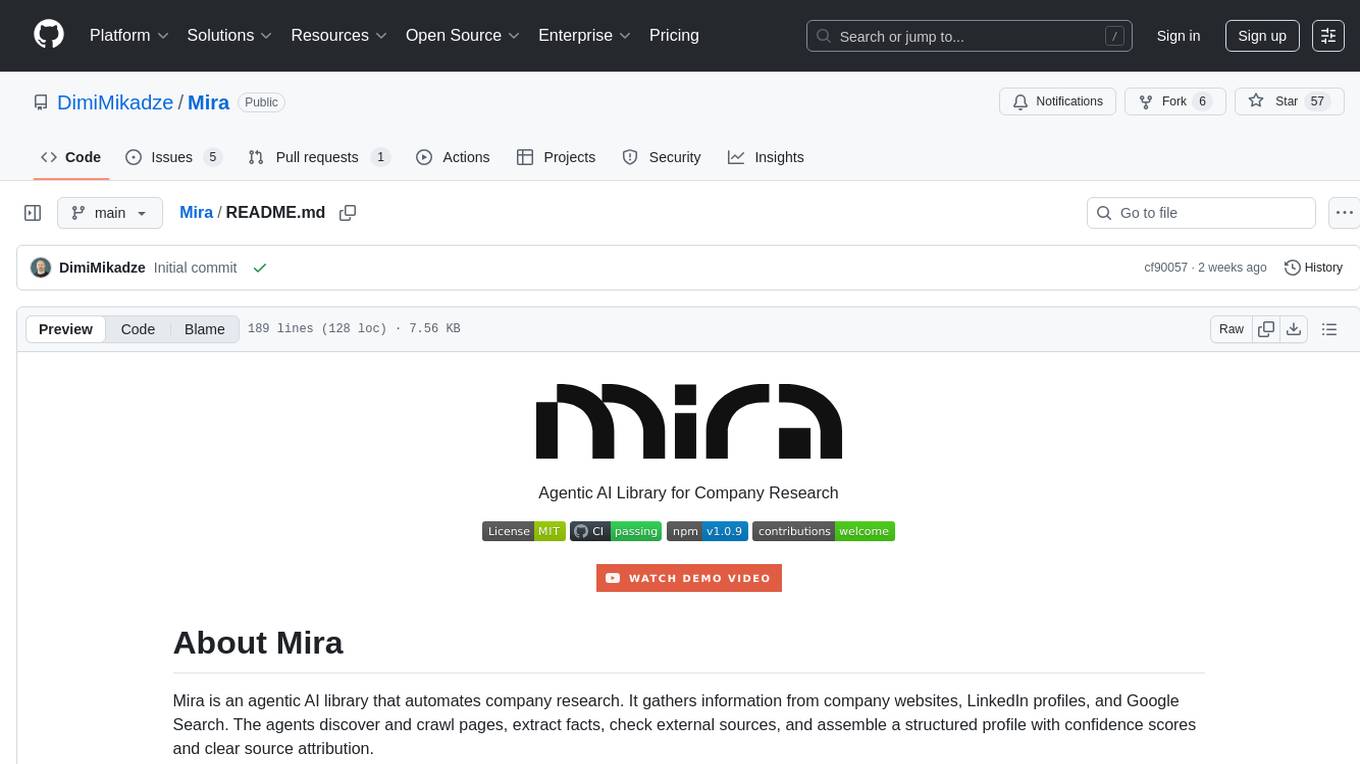
Mira
Mira is an agentic AI library designed for automating company research by gathering information from various sources like company websites, LinkedIn profiles, and Google Search. It utilizes a multi-agent architecture to collect and merge data points into a structured profile with confidence scores and clear source attribution. The core library is framework-agnostic and can be integrated into applications, pipelines, or custom workflows. Mira offers features such as real-time progress events, confidence scoring, company criteria matching, and built-in services for data gathering. The tool is suitable for users looking to streamline company research processes and enhance data collection efficiency.
For similar tasks

dotclaude
A sophisticated multi-agent configuration system for Claude Code that provides specialized agents and command templates to accelerate code review, refactoring, security audits, tech-lead-guidance, and UX evaluations. It offers essential commands, directory structure details, agent system overview, command templates, usage patterns, collaboration philosophy, sync management, advanced usage guidelines, and FAQ. The tool aims to streamline development workflows, enhance code quality, and facilitate collaboration between developers and AI agents.
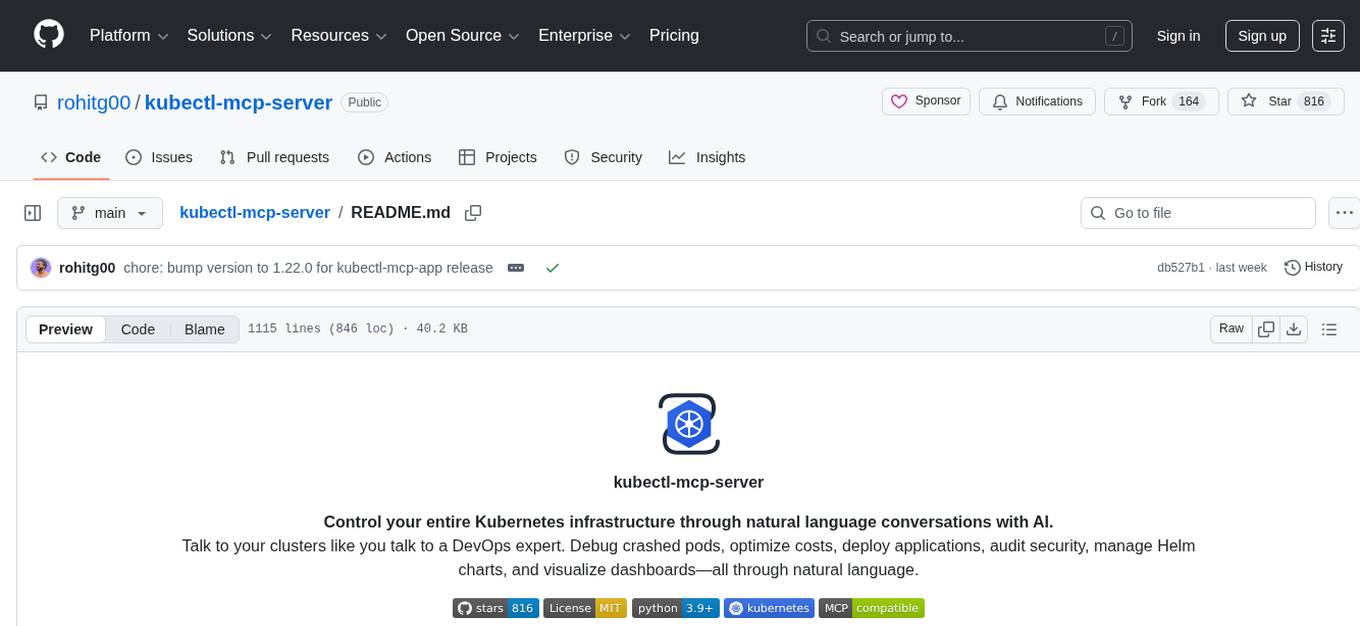
kubectl-mcp-server
Control your entire Kubernetes infrastructure through natural language conversations with AI. Talk to your clusters like you talk to a DevOps expert. Debug crashed pods, optimize costs, deploy applications, audit security, manage Helm charts, and visualize dashboards—all through natural language. The tool provides 253 powerful tools, 8 workflow prompts, 8 data resources, and works with all major AI assistants. It offers AI-powered diagnostics, built-in cost optimization, enterprise-ready features, zero learning curve, universal compatibility, visual insights, and production-grade deployment options. From debugging crashed pods to optimizing cluster costs, kubectl-mcp-server is your AI-powered DevOps companion.

sweep
Sweep is an AI junior developer that turns bugs and feature requests into code changes. It automatically handles developer experience improvements like adding type hints and improving test coverage.
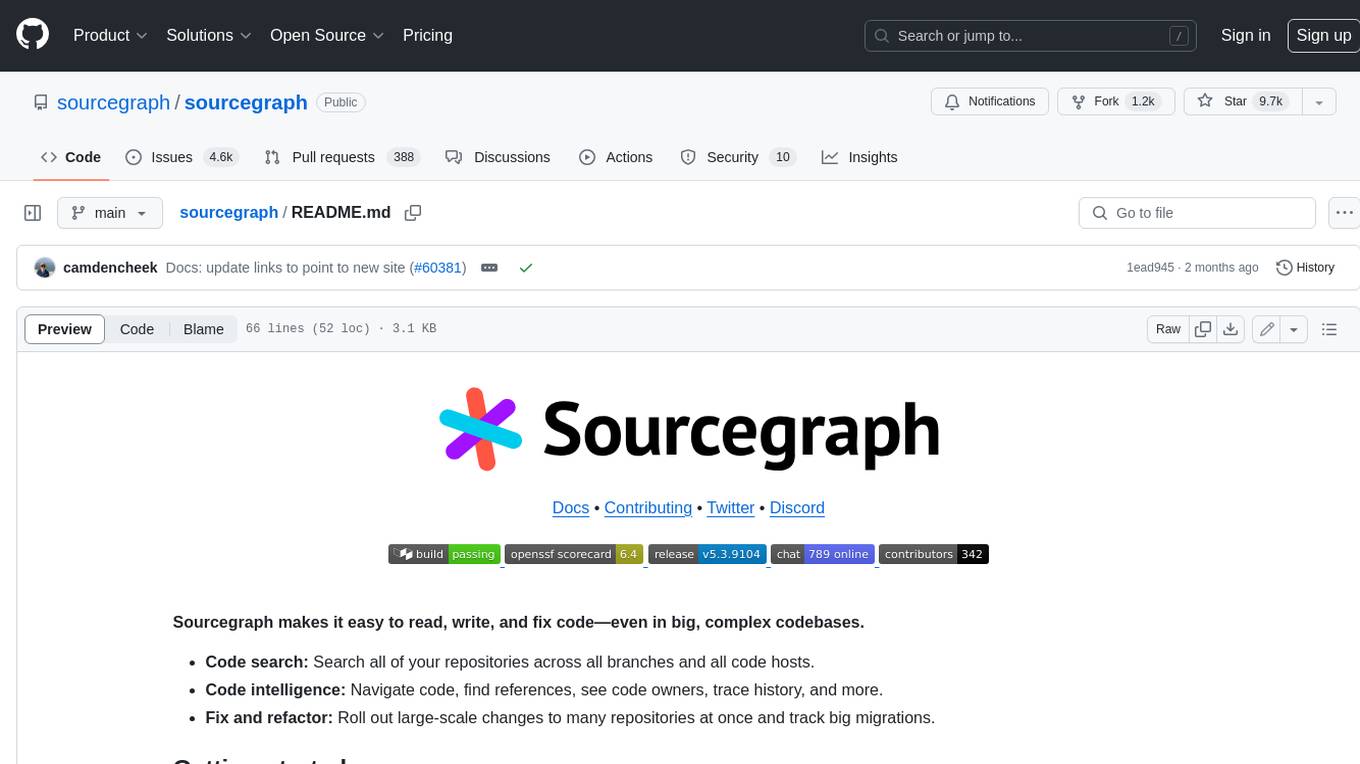
sourcegraph
Sourcegraph is a code search and navigation tool that helps developers read, write, and fix code in large, complex codebases. It provides features such as code search across all repositories and branches, code intelligence for navigation and refactoring, and the ability to fix and refactor code across multiple repositories at once.
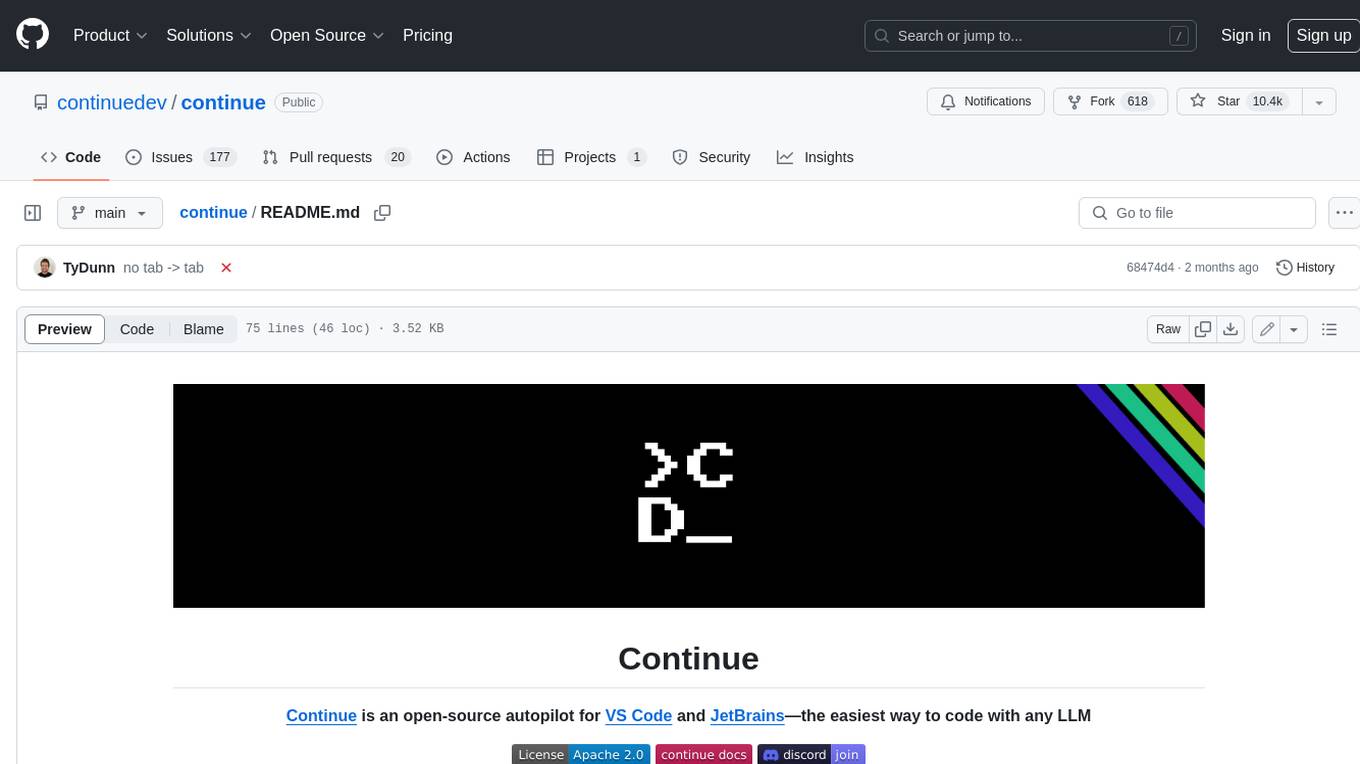
continue
Continue is an open-source autopilot for VS Code and JetBrains that allows you to code with any LLM. With Continue, you can ask coding questions, edit code in natural language, generate files from scratch, and more. Continue is easy to use and can help you save time and improve your coding skills.
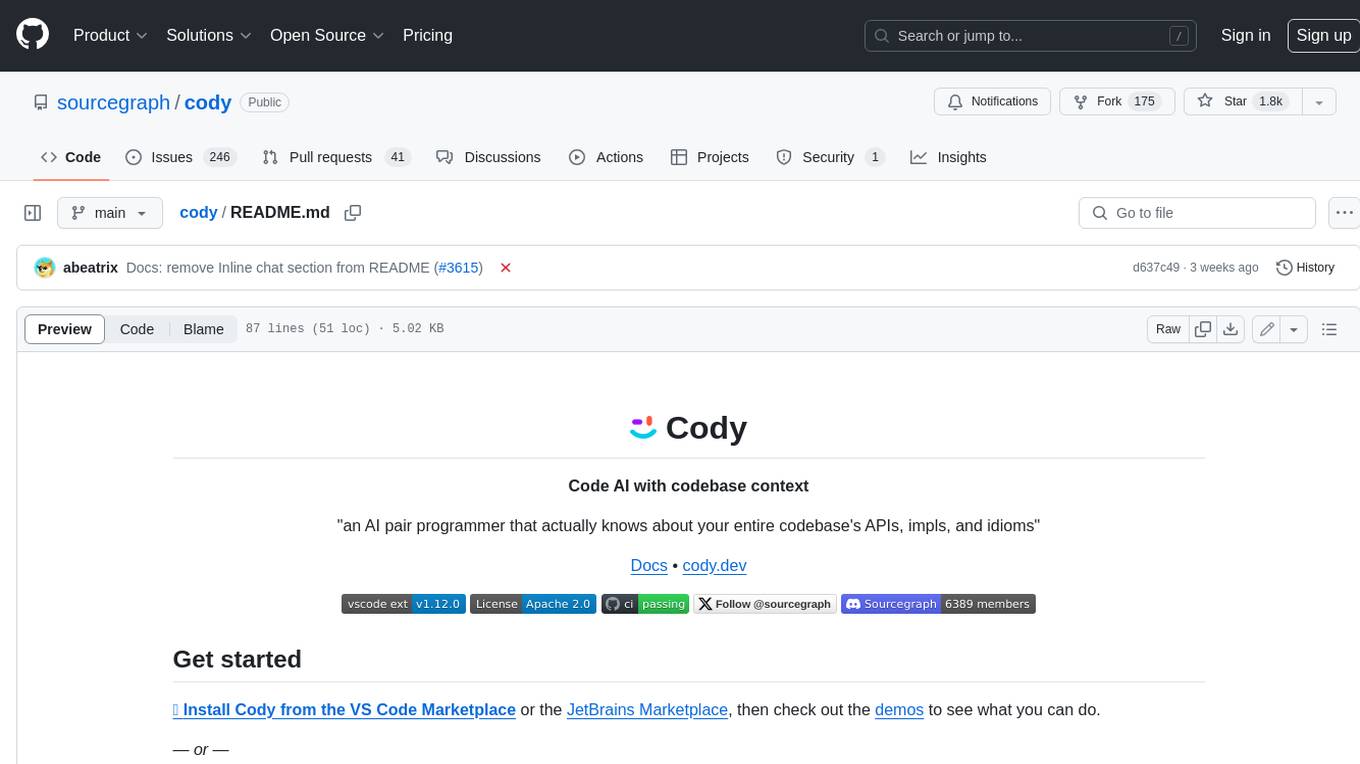
cody
Cody is a free, open-source AI coding assistant that can write and fix code, provide AI-generated autocomplete, and answer your coding questions. Cody fetches relevant code context from across your entire codebase to write better code that uses more of your codebase's APIs, impls, and idioms, with less hallucination.
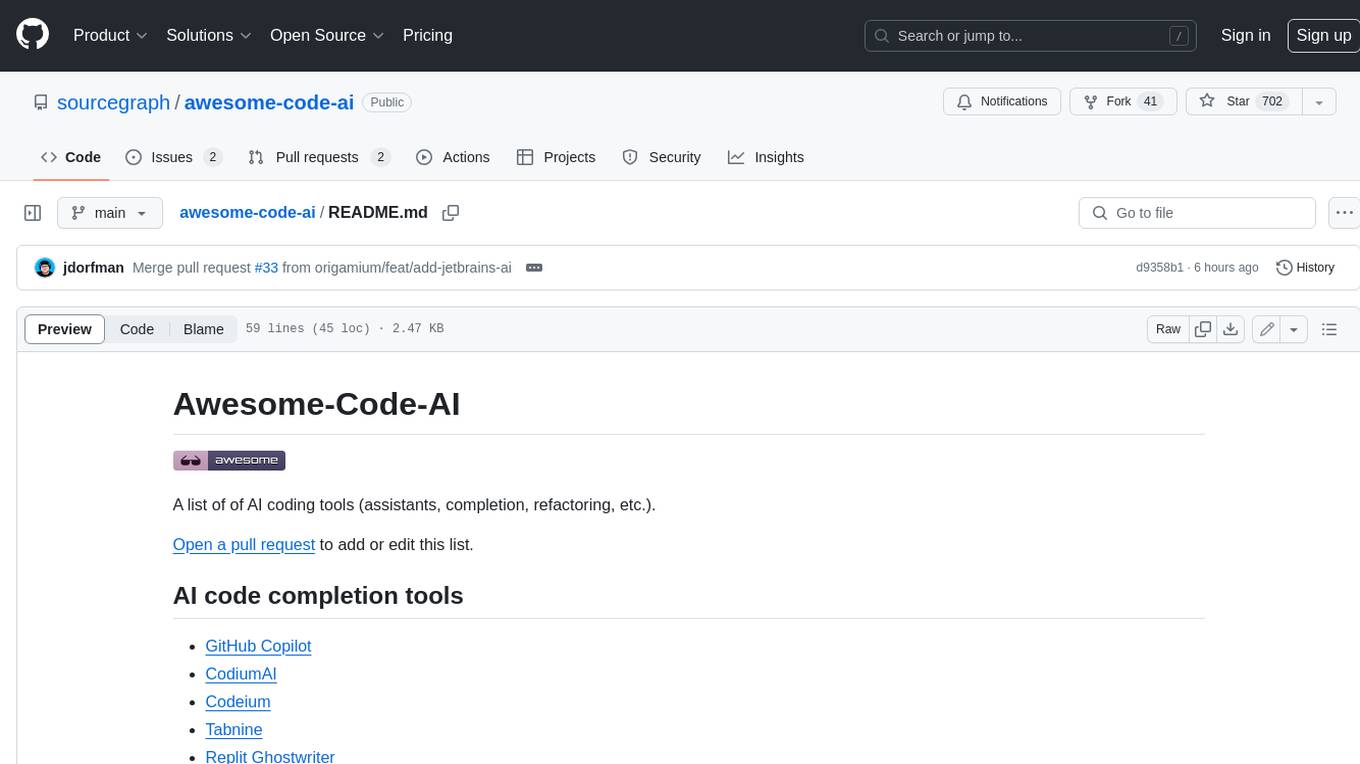
awesome-code-ai
A curated list of AI coding tools, including code completion, refactoring, and assistants. This list includes both open-source and commercial tools, as well as tools that are still in development. Some of the most popular AI coding tools include GitHub Copilot, CodiumAI, Codeium, Tabnine, and Replit Ghostwriter.
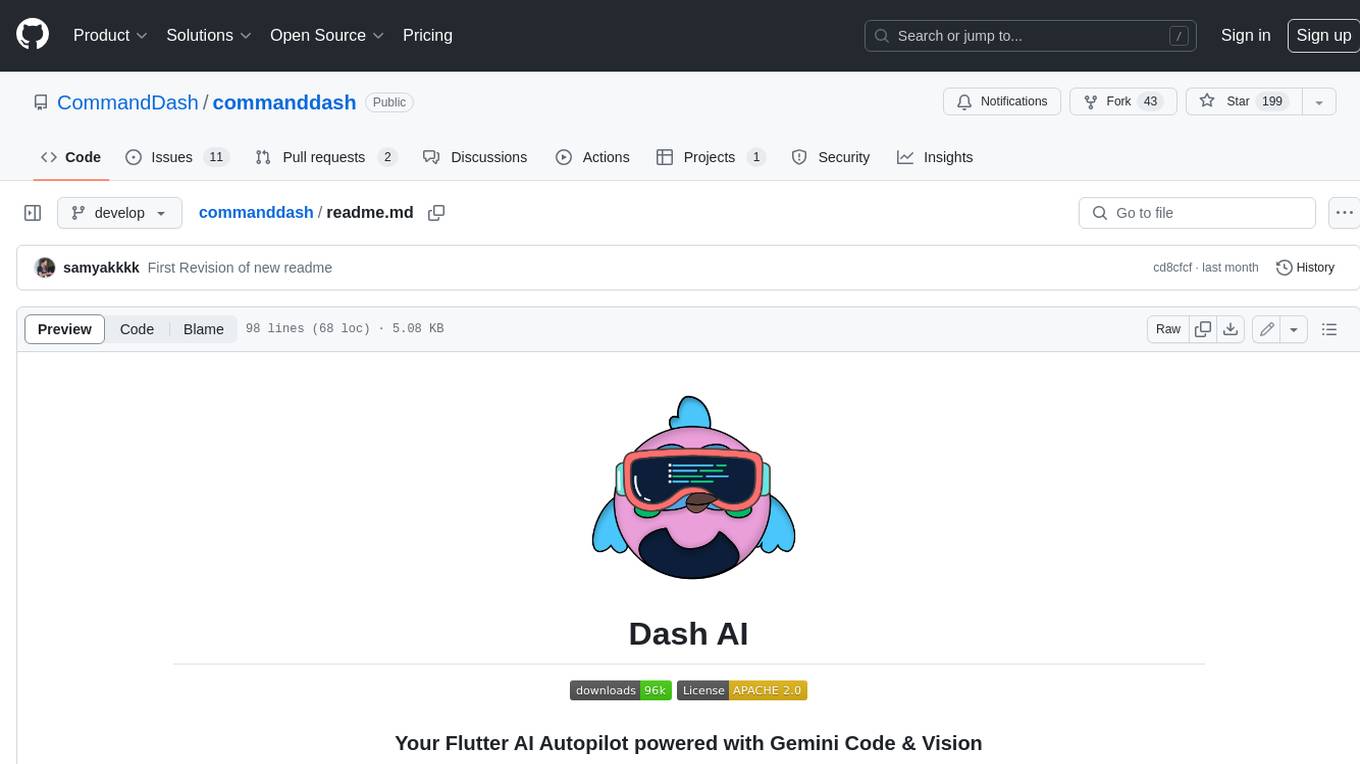
commanddash
Dash AI is an open-source coding assistant for Flutter developers. It is designed to not only write code but also run and debug it, allowing it to assist beyond code completion and automate routine tasks. Dash AI is powered by Gemini, integrated with the Dart Analyzer, and specifically tailored for Flutter engineers. The vision for Dash AI is to create a single-command assistant that can automate tedious development tasks, enabling developers to focus on creativity and innovation. It aims to assist with the entire process of engineering a feature for an app, from breaking down the task into steps to generating exploratory tests and iterating on the code until the feature is complete. To achieve this vision, Dash AI is working on providing LLMs with the same access and information that human developers have, including full contextual knowledge, the latest syntax and dependencies data, and the ability to write, run, and debug code. Dash AI welcomes contributions from the community, including feature requests, issue fixes, and participation in discussions. The project is committed to building a coding assistant that empowers all Flutter developers.
For similar jobs

sourcegraph
Sourcegraph is a code search and navigation tool that helps developers read, write, and fix code in large, complex codebases. It provides features such as code search across all repositories and branches, code intelligence for navigation and refactoring, and the ability to fix and refactor code across multiple repositories at once.
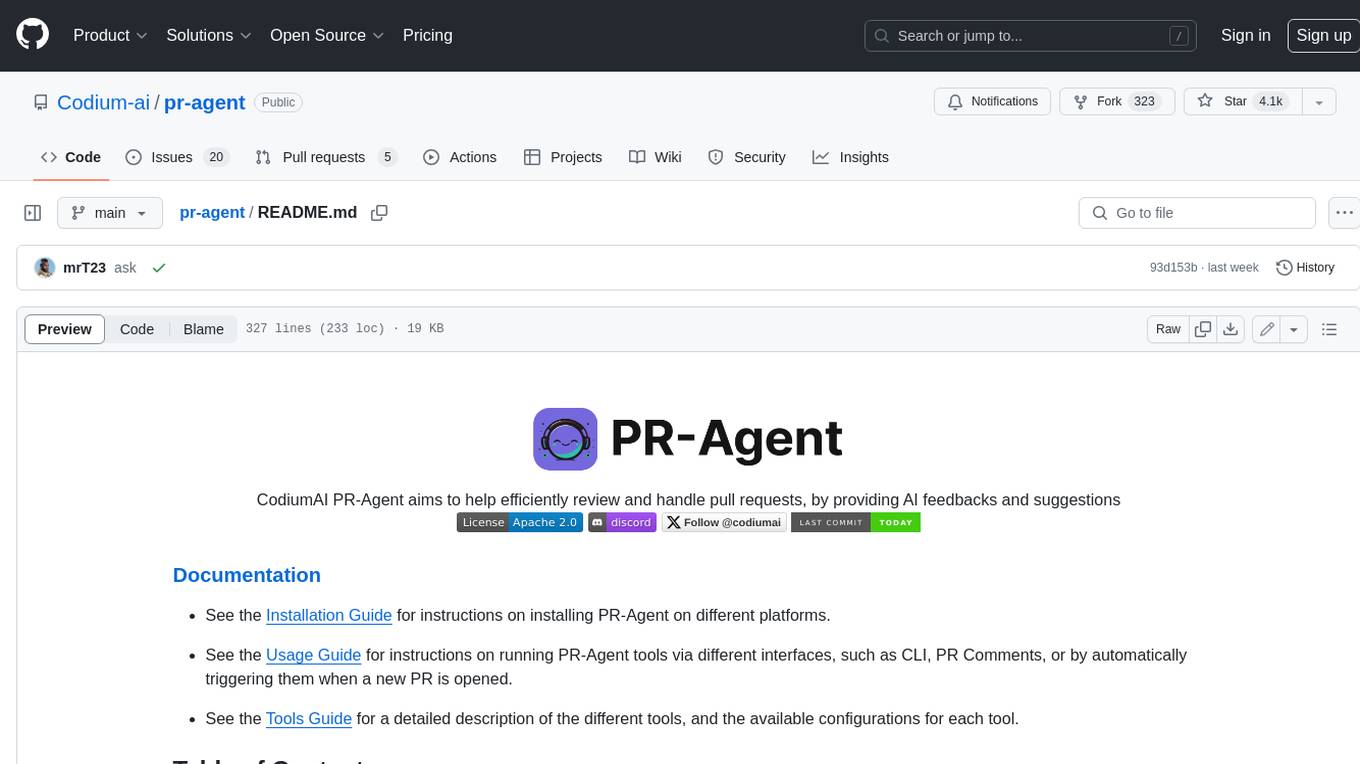
pr-agent
PR-Agent is a tool that helps to efficiently review and handle pull requests by providing AI feedbacks and suggestions. It supports various commands such as generating PR descriptions, providing code suggestions, answering questions about the PR, and updating the CHANGELOG.md file. PR-Agent can be used via CLI, GitHub Action, GitHub App, Docker, and supports multiple git providers and models. It emphasizes real-life practical usage, with each tool having a single GPT-4 call for quick and affordable responses. The PR Compression strategy enables effective handling of both short and long PRs, while the JSON prompting strategy allows for modular and customizable tools. PR-Agent Pro, the hosted version by CodiumAI, provides additional benefits such as full management, improved privacy, priority support, and extra features.
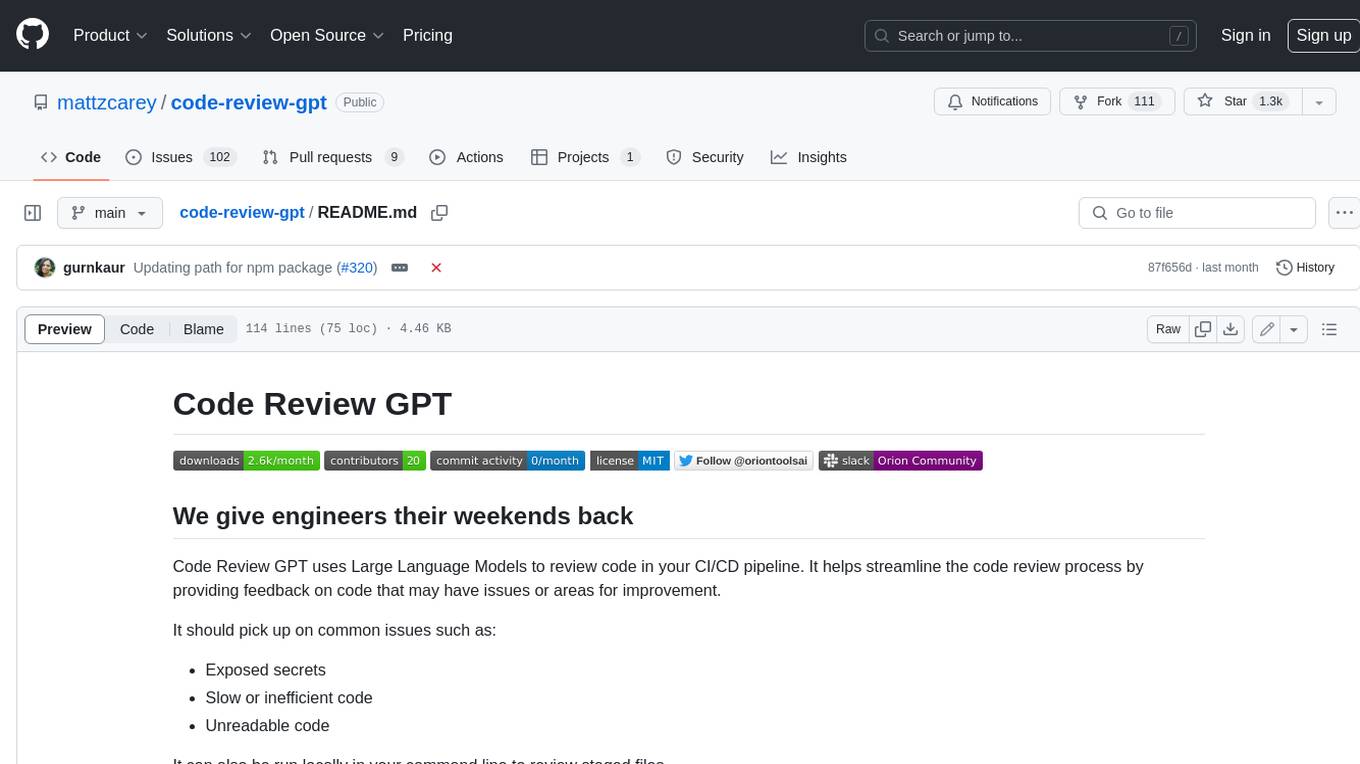
code-review-gpt
Code Review GPT uses Large Language Models to review code in your CI/CD pipeline. It helps streamline the code review process by providing feedback on code that may have issues or areas for improvement. It should pick up on common issues such as exposed secrets, slow or inefficient code, and unreadable code. It can also be run locally in your command line to review staged files. Code Review GPT is in alpha and should be used for fun only. It may provide useful feedback but please check any suggestions thoroughly.

DevoxxGenieIDEAPlugin
Devoxx Genie is a Java-based IntelliJ IDEA plugin that integrates with local and cloud-based LLM providers to aid in reviewing, testing, and explaining project code. It supports features like code highlighting, chat conversations, and adding files/code snippets to context. Users can modify REST endpoints and LLM parameters in settings, including support for cloud-based LLMs. The plugin requires IntelliJ version 2023.3.4 and JDK 17. Building and publishing the plugin is done using Gradle tasks. Users can select an LLM provider, choose code, and use commands like review, explain, or generate unit tests for code analysis.
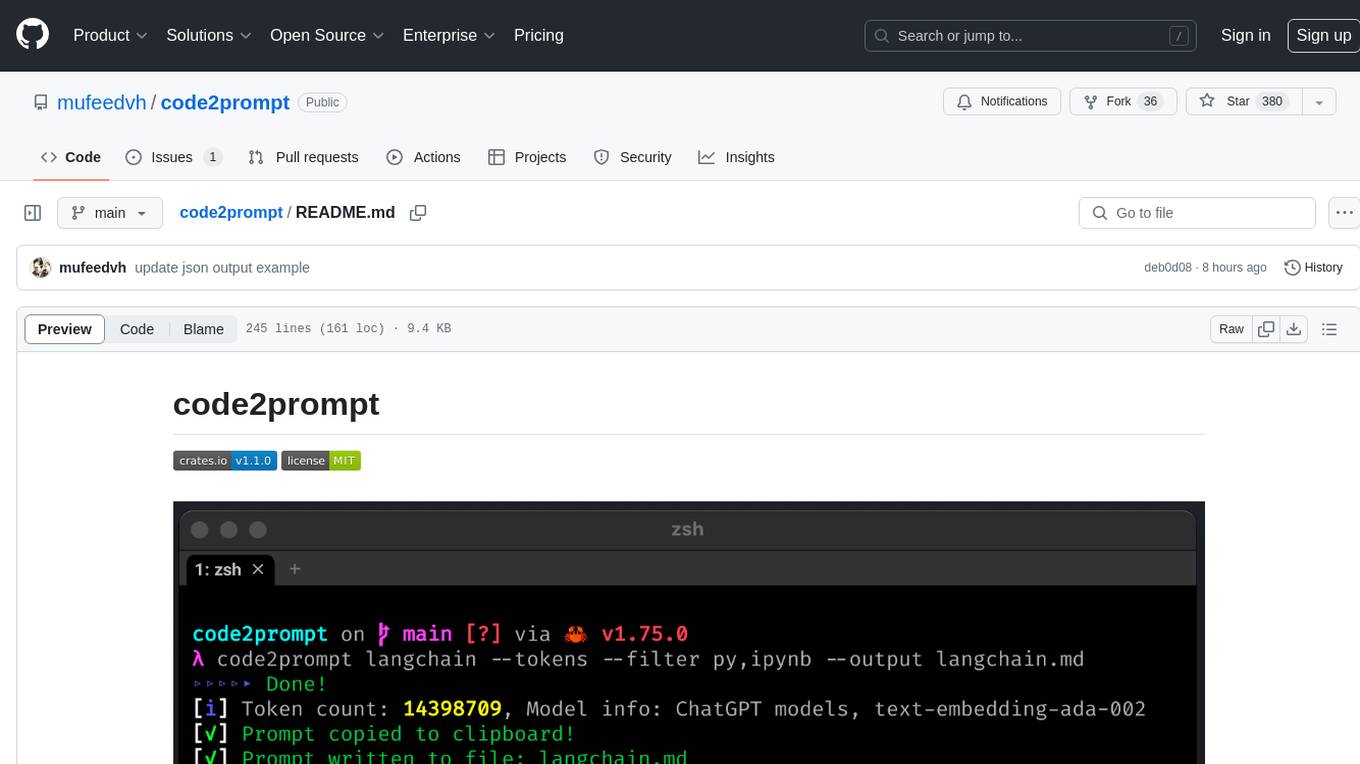
code2prompt
code2prompt is a command-line tool that converts your codebase into a single LLM prompt with a source tree, prompt templating, and token counting. It automates generating LLM prompts from codebases of any size, customizing prompt generation with Handlebars templates, respecting .gitignore, filtering and excluding files using glob patterns, displaying token count, including Git diff output, copying prompt to clipboard, saving prompt to an output file, excluding files and folders, adding line numbers to source code blocks, and more. It helps streamline the process of creating LLM prompts for code analysis, generation, and other tasks.
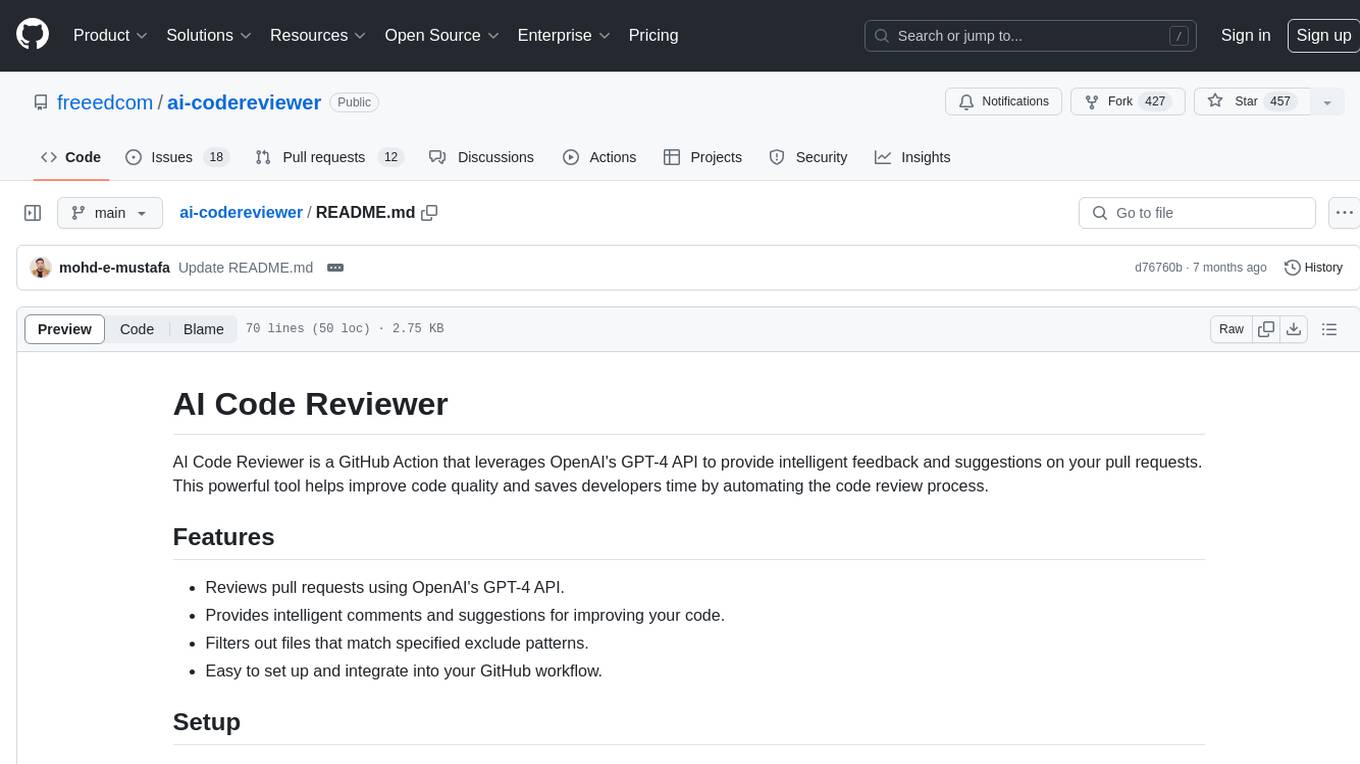
ai-codereviewer
AI Code Reviewer is a GitHub Action that utilizes OpenAI's GPT-4 API to provide intelligent feedback and suggestions on pull requests. It helps enhance code quality and streamline the code review process by offering insightful comments and filtering out specified files. The tool is easy to set up and integrate into GitHub workflows.
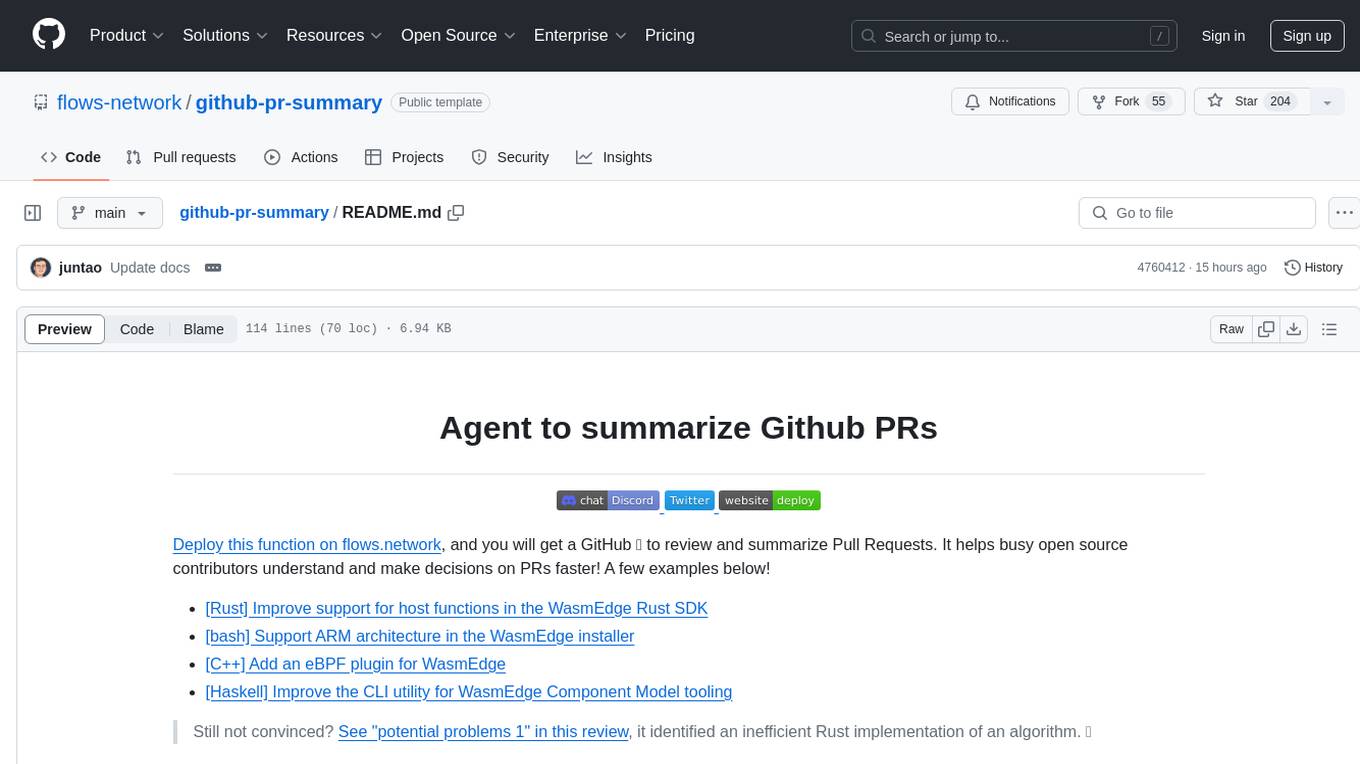
github-pr-summary
github-pr-summary is a bot designed to summarize GitHub Pull Requests, helping open source contributors make faster decisions. It automatically summarizes commits and changed files in PRs, triggered by new commits or a magic trigger phrase. Users can deploy their own code review bot in 3 steps: create a bot from their GitHub repo, configure it to review PRs, and connect to GitHub for access to the target repo. The bot runs on flows.network using Rust and WasmEdge Runtimes. It utilizes ChatGPT/4 to review and summarize PR content, posting the result back as a comment on the PR. The bot can be used on multiple repos by creating new flows and importing the source code repo, specifying the target repo using flow config. Users can also change the magic phrase to trigger a review from a PR comment.
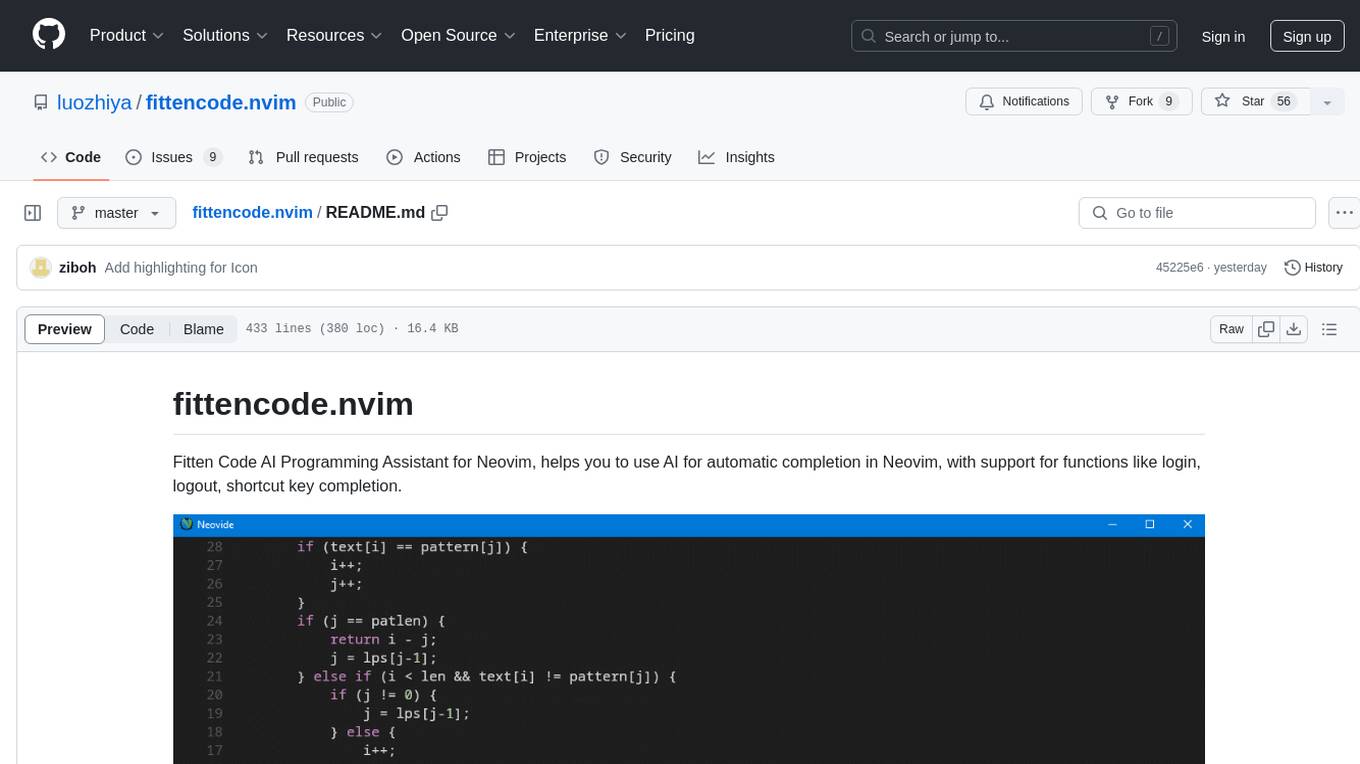
fittencode.nvim
Fitten Code AI Programming Assistant for Neovim provides fast completion using AI, asynchronous I/O, and support for various actions like document code, edit code, explain code, find bugs, generate unit test, implement features, optimize code, refactor code, start chat, and more. It offers features like accepting suggestions with Tab, accepting line with Ctrl + Down, accepting word with Ctrl + Right, undoing accepted text, automatic scrolling, and multiple HTTP/REST backends. It can run as a coc.nvim source or nvim-cmp source.




